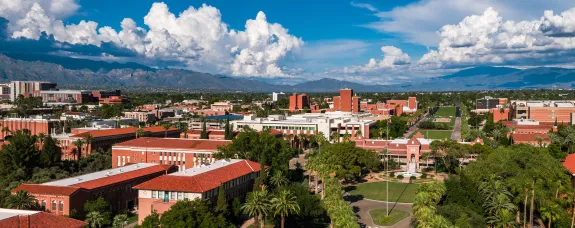
MS Program in Physiological Sciences
At the University of Arizona, the Graduate College sets the overall framework for the completion of the master's degree. Within these guidelines, the Physiological Sciences Graduate Interdisciplinary Program establishes specific requirements and monitors student progress to ensure:
- Sufficient breadth of knowledge in Physiological Sciences
- Sufficient depth of knowledge in the students area of specialty
- Rigorous research training
- Training in career skills (writing, speaking, critical evaluation of the literature)
- Training in teaching skills
General Overview
The M.S. degree requires a minimum of 30 units of graduate work, which includes required foundational coursework, additional coursework as determined on an individualized basis by the student's Master's Committee, and research units. Typically, students are able to attain their Master's degree in two years, barring exceptional circumstances.
With approval from the student's committee, the student will choose one of 3 options described below as the final requirement for the M.S.
- Master’s Thesis and Oral Examination: A traditional thesis is written following the Master’s Thesis Formatting Guide, provided by the Graduate College: https://grad.arizona.edu/gsas/dissertations-theses. A public oral presentation is required, followed by a defense of the document to the committee.
- Research Manuscript (written document) and Oral Examination: A summary of the research project in the form of a “first author” manuscript that may be submitted for publication. A public oral presentation is required, followed by a defense of the document to the committee.
- Written Scientific Document (review) and Oral Examination: Demonstrate scientific insight/integrative thinking by writing a critical literature review. A public oral presentation is required, followed by a defense of the review and oral examination by the committee.
Major Coursework Outline
Part of the student's course requirements consist of the following courses, in which the student must attain a "B" letter grade or better:
- PSIO 503 - Cellular and Molecular Physiology (6 units, Fall Semester only)
- PSIO 603 - Systems Physiology (6 units, Spring semester only)
- PS 696c - Student Forum (1 unit, taken each academic semester until graduation)
- Student Forum is an opportunity for graduate students to give talks and receive peer evaluation from Physiology students and faculty to improve their public speaking skills.
- PSIO 696a - Physiology Seminar (1 unit, taken each academic semester until graduation)
- On alternative weeks to Student Forum, students are required to attend the Physiology Seminar, in which speakers are invited from on-campus and off-campus institutions to deliver seminars on subjects relevant to Physiology.
- PSIO 697a, PSIO 697b - Teaching Workshop (1 unit each semester, 2 semesters total)
- Only taken if a TA
- PS 700 - Research Methods (3 units, must be taken at least once)
- PS 900 - Research units (4 units, each semester)
Students will select additional courses in consultation with their Master's Committee, with a goal of developing a study plan that is individually tailored to the student's particular interests and that will satisfy Graduate College requirements.
Research Units
Participation in research, under the supervision and guidance of a faculty member, allows students to learn valuable skills, to gain experience in the research "process", and to organize and present research results in both written and oral formats.
All Master's Students in the Master's program are expected to participate in research and are encouraged to take advantage of the excellent opportunities to experience the research process in the variety of different labs associated with the Physiological Sciences program.
Master's Committee
By the beginning of the student's second year in the program, the student will select a formal Master's Committee. This Committee will consist of a major advisor and two additional members from the faculty of the Physiological Sciences program.
The responsibilities of the Master's Committee will be to help the student develop a specialized study plan catering to the student's particular interests, select additional courses based upon this study plan, monitor the student's academic progress, and advise the student in the final degree requirement.
The Committee should meet for the first time near the beginning of the student's second semester to establish and/or review the student's curriculum plan. The Master's Committee should then meet once per semester thereafter. The Committee will meet during the student's final semester to help the student choose how they will meet their final requirement for completion of the degree, and will preside over the student's thesis or oral exam.
Sample Master's Career
This table represents a sample career of a generic Master's student (with a Research assistantship), and is subject to change depending on the student's financial aid and the study plan developed by the student and their Master's Committee.
| 1st Year | Fall: PSIO 503 - Cellular & Molecular Physiology (6 units) PS 696c - Student Forum (1 unit) PSIO 696a - Physiology Seminar (1 unit) PS 700 - Research Methods (3 units) PS 6967a - Teaching Workshop (1 unit) *Only if a TA. |
Spring: PSIO 603 - Systems Physiology (6 units) PS 696c - Student Forum (1 unit) PS 700 - Research Methods (3 units) PS 6967b - Teaching Workshop (1 unit) *Only if a TA. | |
| 2nd Year | Fall: - Form Master's Committee - Submit Plan of Study - Complete 20 minute Forum Presentation PS 696c - Student Forum (1 unit) PSIO 696a - Physiology Seminar (1 unit) PS 900/910 - Research Units (4 units) |
Spring: - Submit Master's Committee Form - Complete and Defend Master's Thesis/Research Manuscript PS 696c - Student Forum (1 unit) PSIO 696a - Physiology Seminar (1 unit) PS 900/910 - Research Units (4 units) |
*Many Master's students are required to assume roles as teaching or research assistants to maintain their financial aid, in addition to satisfying the coursework required for a Master's degree.
Additional information and details on the PhD program can be found in the PS Student Handbook.

